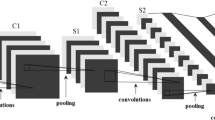Abstract
Power control is a fundamental procedure for CDMA mobile radio communication systems. In multiservice CDMA systems, power control should be used to minimise the transmission power of each connection, in order to limit the multiple access interference, while obtaining the desirable SIR levels. This paper starts from a transmitted-power allocation algorithm (TPAA) that considers a set of uplink transmissions, which should be supported by the system. In the sequel, the TPAA algorithm is used for training an Elman neural network, which, due to its internal characteristics, is applicable in the time critical context of power control. Simulations and numerical results are analysed for obtaining a solid basis for employing our scheme in the power control of CDMA systems.
Similar content being viewed by others
Author information
Authors and Affiliations
Corresponding author
Rights and permissions
About this article
Cite this article
Tsagkaris, K., Demestichas, P., Vasilakos, A. et al. Power control in CDMA networks based on soft computing methods. Soft Comput 9, 81–87 (2005). https://doi.org/10.1007/s00500-003-0349-0
Published:
Issue Date:
DOI: https://doi.org/10.1007/s00500-003-0349-0




